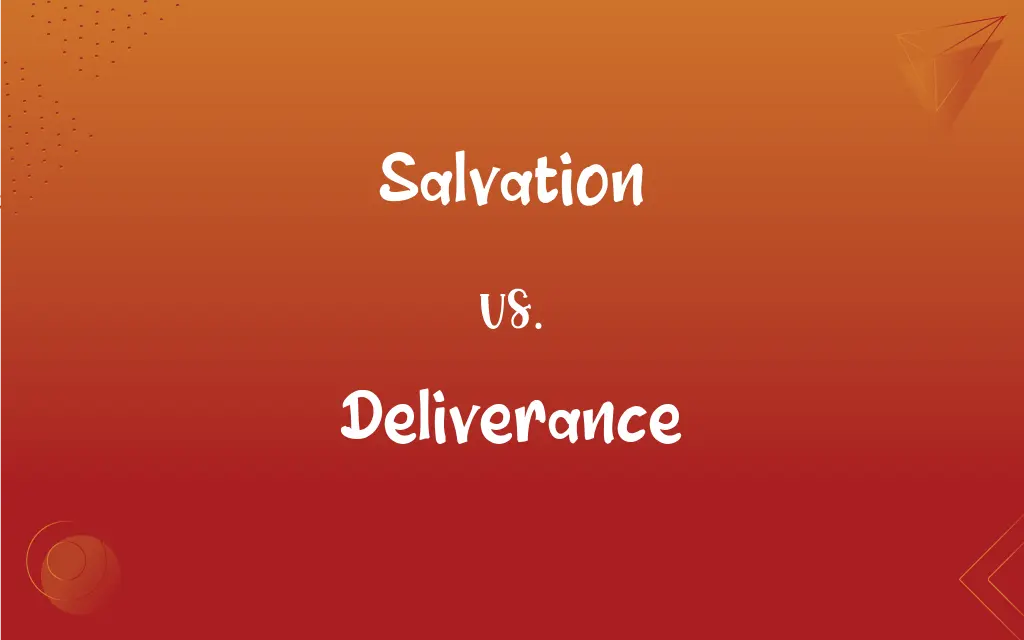Salvation vs. Deliverance: What's the Difference?
Edited by Janet White || By Harlon Moss || Updated on November 10, 2023
Salvation refers to being saved from sin or its consequences; Deliverance often means rescue or liberation from danger or a difficult situation.

Key Differences
Salvation is typically understood in a religious context, referring to the saving of the soul from sin and its consequences. Deliverance, while it can have religious connotations, often refers to being rescued or set free from a specific danger or difficult situation.
In many religious traditions, salvation is associated with eternal life or liberation from the cycle of birth and death. Deliverance, on the other hand, is more temporal and can refer to liberation from earthly troubles or oppressions.
Salvation is often seen as a process or a state that is achieved, sometimes through divine grace or faith. Deliverance, in contrast, is typically more immediate, like being delivered from immediate harm or a problematic situation.
The pursuit of salvation is usually a spiritual journey, involving moral or ethical considerations and personal transformation. Deliverance, while it can be spiritual, often has a more practical or physical connotation, like being saved from a dangerous or oppressive situation.
Salvation is more about the eternal soul and moral redemption, while deliverance is more about being rescued from immediate dangers or difficult circumstances in the here and now.
ADVERTISEMENT
Comparison Chart
Primary Context
Religious, spiritual
Can be religious or temporal
Focus
Saving the soul, eternal life
Rescue from danger or difficult situations
Temporality
Often viewed as eternal or long-term
Usually immediate or short-term
Process
Involves spiritual journey and transformation
Often involves a physical or immediate change
Connotation
Moral, ethical redemption
Practical liberation or rescue
ADVERTISEMENT
Salvation and Deliverance Definitions
Salvation
Preservation from destruction or failure.
The artist saw his work as his salvation from obscurity.
Deliverance
Liberation from slavery or restraint.
The novel depicted the deliverance of the protagonist from captivity.
Salvation
The act of being saved from sin and its consequences.
In her faith, she found salvation and a sense of peace.
Deliverance
Relief or rescue from moral, spiritual, or physical evil.
The community saw the new law as a deliverance from injustice.
Salvation
Deliverance from harm, ruin, or loss in a spiritual sense.
They believed that salvation came through living a virtuous life.
Deliverance
A sudden rescue from danger or calamity.
The sudden rain was a deliverance for the drought-stricken village.
Salvation
In theology, the deliverance of humankind from sin.
The concept of salvation is central to many religious teachings.
Deliverance
The act of being rescued or set free.
The mountaineers' deliverance came with the arrival of the rescue team.
Salvation
Liberation from ignorance or illusion in a spiritual journey.
Meditation was her path to salvation and enlightenment.
Deliverance
The action of being saved from a dangerous or distressing situation.
Deliverance from the island was all that the stranded tourists hoped for.
Salvation
Preservation or deliverance from destruction, difficulty, or evil.
Deliverance
The act of delivering or the condition of being delivered.
Salvation
A source, means, or cause of such preservation or deliverance.
Deliverance
Rescue from bondage or danger.
Salvation
Deliverance from the power or penalty of sin; redemption.
Deliverance
A publicly expressed opinion or judgment, such as the verdict of a jury.
FAQs
Can deliverance be from something other than physical danger?
Yes, deliverance can also refer to being freed from non-physical forms of distress, like emotional or spiritual burdens.
Can deliverance have a religious meaning?
Yes, deliverance can also have a religious connotation, but it often refers to physical or temporal rescue.
What is the essential meaning of salvation?
Salvation typically refers to the saving of the soul from sin and its consequences, often in a religious context.
Can salvation occur in this life?
Some beliefs hold that aspects of salvation can be experienced during one's lifetime.
Is deliverance always instant?
While deliverance often implies a swift change, the process or aftermath can sometimes be gradual.
Do all cultures have a concept of salvation?
Most cultures have some concept of salvation, though the specifics vary widely.
How is deliverance achieved?
Deliverance is often achieved through rescue by others, self-liberation, or a change in circumstances.
Is the concept of salvation the same in all religions?
No, the concept of salvation varies significantly among different religious traditions.
Is salvation only a Christian concept?
While prominent in Christianity, concepts of salvation are found in various religions, each with its unique interpretation.
Is salvation always related to an afterlife?
In many religious traditions, salvation is indeed related to the afterlife, but interpretations can vary.
Can deliverance be a state of mind?
Yes, deliverance can be experienced as a psychological or emotional state of being freed from distress.
Can one's actions lead to salvation?
Beliefs vary, but many religions suggest that actions, faith, or divine grace can lead to salvation.
Does salvation have different meanings in different contexts?
Yes, salvation can have various meanings in different religious, spiritual, or even secular contexts.
Can salvation change a person’s life?
Yes, the pursuit or attainment of salvation can profoundly affect a person's life and choices.
Is belief in a deity necessary for salvation?
This depends on the religious or spiritual belief system; some require belief in a deity, while others do not.
Is deliverance always a positive experience?
Generally, yes, though the circumstances leading to it might be challenging or negative.
Does deliverance always involve external help?
Not always; it can also come from personal efforts or a change in one’s own situation or perspective.
Can deliverance be self-achieved?
Yes, deliverance can be achieved through one's own actions or changes in perception.
Can deliverance be temporary?
Yes, deliverance can be temporary, especially if it pertains to specific situations or challenges.
Is deliverance always from something negative?
Typically, deliverance is from a negative or harmful situation, but it can also be from limitations or restrictions.
About Author
Written by
Harlon MossHarlon is a seasoned quality moderator and accomplished content writer for Difference Wiki. An alumnus of the prestigious University of California, he earned his degree in Computer Science. Leveraging his academic background, Harlon brings a meticulous and informed perspective to his work, ensuring content accuracy and excellence.
Edited by
Janet WhiteJanet White has been an esteemed writer and blogger for Difference Wiki. Holding a Master's degree in Science and Medical Journalism from the prestigious Boston University, she has consistently demonstrated her expertise and passion for her field. When she's not immersed in her work, Janet relishes her time exercising, delving into a good book, and cherishing moments with friends and family.































































